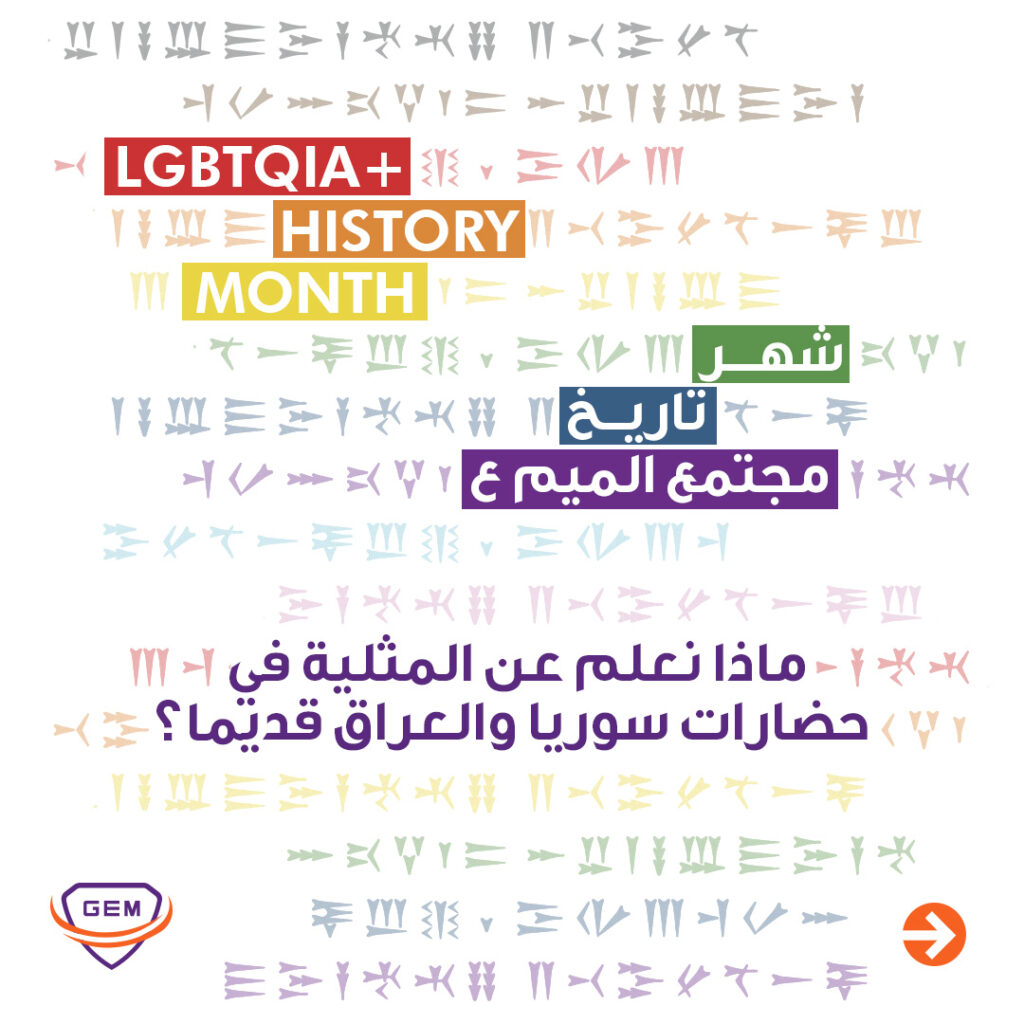Sabatino Moscati, author of the book *The Ancient Semitic Civilizations*, states that “despite its overall originality, Greek civilization owes much of its ideas to the peoples of Mesopotamia.”
On the other hand, many who attack homosexuality and consider it a “phenomenon” argue that our history was never tolerant of it, and that rejecting it is a human “instinct,” claiming that those who practice it are going against this “instinct” and that it is a “Western idea.” What they may not know is that the laws and cultures of our ancient civilizations did not prohibit homosexuality or punish those who engaged in same-sex relationships. In fact, in some cases, it even granted strong male individuals a higher social status and legal privileges.
Reaching this conclusion is not difficult if we follow the findings of archaeologists, ancient language scholars, historians, and other human sciences. They have clearly found, through literary texts and cuneiform inscriptions, that homosexuality was neither criminalized nor prohibited in some of the ancient civilizations of the Syrian and Mesopotamian regions.
Hittite law in northern Syria and homosexuality:
In an article titled “Sexuality. Among the Hittites.” by the Hittitologist Harry Hoffner, we find that Hittite law, followed by the Hittites who ruled the Anatolian and northern Syrian regions, did not prohibit homosexuality. Hoffner refers to the Hittite law text, which states: “If a man violates his daughter, this is a crime punishable by death. If a man violates his son, it is a crime punishable by death.”
Hoffner notes that homosexuality was not prohibited among the Hittites, and according to Hittite law, “the man who engages in intercourse with his son is guilty because his partner is his son, not because they are of the same sex.” Therefore, same-sex relationships were not prohibited during that period in the Hittite civilization, which inhabited Syria and Anatolia.
The cult of Ishtar/Inanna and the rituals of gender transformation:
Ishtar (Inanna) was the goddess of love and fertility for the Sumerians and became the goddess of love, sex, fertility, desire, war, power, and justice in Mesopotamian civilization, particularly among the Akkadians. Historians say that some of her followers were gender-nonconforming individuals, and she was believed to bless and give permission for gender transformation during religious rituals inside her temples.
In the city of Mari in northern Syria during the third millennium BCE, Ishtar took on multiple forms, one of which was male, but she was not fully male. She was a female with masculine sexual characteristics and was grammatically referred to as female. Historians have considered her to have a complex and ambiguous gender identity. In one of her texts, she states, “I am a woman, I am a man.”
In his book *Homoeroticism in the Biblical World: A Historical Perspective*, Finnish professor and theorist Martti Nissinen traces homosexual behavior and same-sex relationships throughout history. Based on the translation of certain Akkadian texts regarding homosexuality, which the author documents, males at that time were granted legal privileges if they were good lovers to their male partners. This reflects another positive view of male homosexual relationships in earlier civilizations.
It is evident from literature, poetry, and some legal codes that cuneiform writings related to the civilizations of Iraq and Syria approached same-sex relationships positively, particularly those between males. Readers can explore the *Epic of Gilgamesh* and analyze the relationship between Gilgamesh and Enkidu, which mythologists and historians have interpreted as expressing a same-sex bond. Additional insights can be found in the *Encyclopedia of the Ancient Near East*, which covers the civilizations of northern Syria, southern Iraq, and Anatolia, especially the cultures associated with cuneiform languages. This encyclopedia was originally founded by Bruno Meissner in 1922 and has evolved over the years.

